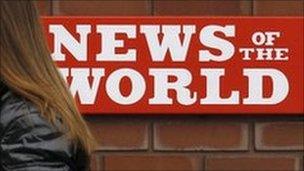News of the World apology 'opens legal can of worms'
- Published

News of the World issued an apology to some victims last week
News International's admission that News of the World journalists hacked into the mobile phones of public figures has opened a legal can of worms - and not just for its own newspapers and journalists.
For years, the company - and other publishers - denied using illegal means to gain stories, even when faced with evidence from investigating authorities that underhand practices were widespread.
These included not just phone-hacking but "blagging" - pretending to be someone you are not, in order to gain personal information you are not entitled to.
In December 2006, the Information Commissioner - whose job is to protect people's privacy under the Data Protection Act - published a league table of more than 30 national newspapers and magazines which had paid private investigators for personal information.
It included details from police records, the DVLA, the Inland Revenue, phone companies and banks.
This was the week after the News of the World's royal editor Clive Goodman pleaded guilty to hacking into the phone messages of royal staff.
Published list
In a report to Parliament, What Price Privacy Now?, the Commissioner said a raid on one private detective's office in 2002 - called Operation Motorman - had uncovered hundreds of invoices to publications, identifying 305 journalists as recipients of personal information.
It did not name the journalists, but did list the newspapers and magazines.
The table was headed by the Daily Mail, which paid for 952 pieces of information, ordered by 58 of its staff.
Next came the Sunday People, the Daily Mirror, the Mail on Sunday and the News of the World. The BBC published the list at the time, external, but few newspapers did, perhaps not surprisingly.
The Daily Mail's publisher dismissed the findings as "utterly meaningless", saying: "Associated Newspapers, in common with all newspapers and broadcasters - and many other organisations, including lawyers - use search agencies to obtain information entirely legitimately from a range of public sources."
Acquiring some personal information, in some ways, can be legal if used in the public interest.
It can be a legitimate technique of investigative journalism and curtailing that power could infringe the freedom of the press.
The Observer and Sunday Times both appeared in the Information Commissioner's league table, not just tabloids.
More claims?

Actress Sienna Miller is one of several celebrities accusing the News of the World of breach of privacy
This adds to the complexity of the situation, as lawyers seek to bring more claims against newspapers, in the wake of News International's admission of liability.
Ironically, one of the few newspapers to admit to phone-hacking is the Guardian, which exposed the News of the World's illegal activities.
Its investigative reporter David Leigh wrote in the Guardian, external, in the wake of Clive Goodman's guilty plea in 2006.
"I, too, once listened to the mobile phone messages of a corrupt arms company executive - the crime similar to that for which Goodman now faces the prospect of jail. The trick was a simple one: the businessman in question had inadvertently left his pin code on a print-out and all that was needed was to dial straight into his voicemail."
Leigh saw a fundamental distinction between his actions and Goodman's.
"I was not interested in witless tittle-tattle about the royal family. I was looking for evidence of bribery and corruption. And unlike the News of the World, I was not paying a private detective to routinely help me with circulation-boosting snippets.
"That is my defence, when I try to explain newspaper methods to my current university journalism students, some of whom are rather shocked."
It may be a defence under the Data Protection Act, but not under the Regulation of Investigatory Powers Act of 2000.
Caroline Kean, of the law firm Wiggin, says: "It is an offence under section 1 of the RIPA to intercept any communication in the course of its transmission without lawful authority. There is no public interest defence."
Private investigators
On BBC Radio 4's Today programme last week, the editor in chief of the Guardian and Observer, Alan Rusbridger, was asked if he would ever sanction the sort of techniques now under scrutiny.
"Whenever people have come to me and said can I use private detectives, in 99.9% of cases I've said no," he said.
"But the Press Complaints Commission code does say that if you're exposing serious crime, you can use means that are underhand. I think it has to be an incredibly high bar - and in the mass of these cases, it was just celebrity gossip they were after, with no possible justification."
The BBC has also defended its occasional use of private investigators.
Its director of editorial policy and standards, David Jordan, blogged: "To some that has conjured up pictures of dozens of gumshoes beavering away for the BBC, busily hacking into private voicemails or other people's e-mail accounts, or accessing deeply personal and private information illegally...
"It is worth stressing that we are not aware of any BBC programme ever having commissioned a private detective to carry out this sort of illegal activity at any time in the past. It would be totally unacceptable and a serious breach of our editorial standards."
But tabloid newspapers are known to have done such things, and not just the News of the World.
The publicist Max Clifford told the Today programme that many public figures were talking to lawyers about suing other papers.
"James Hewitt is convinced his phone was hacked when he was involved with Princess Diana, not by the News of the World.
"I spoke to Koo Stark two weeks ago - she is convinced her phone was being tapped, not by the News of the World. There's loads of them, particularly now that the News of the World has put its hands up."
So widespread were the practices that the London mayor Boris Johnson has called for a process of truth and reconciliation., external
Writing in the Daily Telegraph, he said: "It is time for every editor and every proprietor to appear before an inquiry and confess. Before it is dragged from them, they need to admit to all the bugging and hacking that they allowed - wittingly or unwittingly - in their organisations."
This is unlikely, given that some papers may soon be facing legal action themselves.
Meanwhile, the spotlight remains firmly on the News of the World. With police investigations, civil court cases and parliamentary inquiries already in train, Britain's biggest-selling paper will remain the centre of attention for many months to come.
- Published15 April 2011
- Published30 August 2012
- Published8 April 2011
- Published4 August 2012
- Published11 July 2011